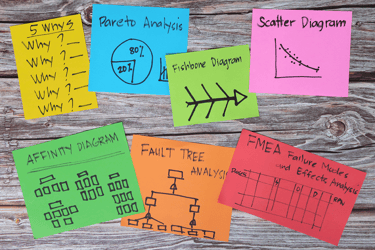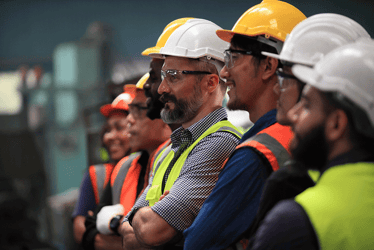The Packaging Industry's Sustainability Challenge: Why ERP Systems Are Essential for Success A straightforward guide to navigating sustainability regulations across folding carton, flexible...
Leveraging technology to drive productivity in packaging
We sat down with Kevin Blakey, ePS' Director of Product Management to talk all things technology and flexible packaging.
Kevin has an intimate thirty year history with the industry and was involved in developing Radius from its infancy and through each evolution into the leading ERP for packaging converters. He shared his views on the current and future state of affairs.
Kevin, what do you feel are the key challenges the flexible industry faces these days?
I won’t be saying anything new when I mention that sustainability and carbon footprint reduction are on all business owners’ minds. The ways of reducing waste are also the main subject and the key argument point of the manufacturers’ green credentials. The driver for this comes from big brands who, as part of their corporate social responsibility (CSR), want to demonstrate they understand and consider the future wellbeing of our planet.
The other growing area of concern is the technical capabilities of traceability of the materials from the supply chain, especially in the food and pharmaceutical sector. We come across those issues more often nowadays.
Looking at the MIS, ERP, workflow software market, what has changed over the last five years?
The market ePS Radius and Packaging Suite is in is cyclical. Over the last five years, we could see businesses moving away from looking for a one-provider solution that looks after every aspect of the company. Thanks to technology advancements and integration capabilities, they are now exploring products from different vendors, so-called “best-of-breed” approach.
We are confident that ePS’s Packaging Suite and its component parts provide excellent solutions and we make sure our entire portfolio is easy to integrate with any other product from ePS and any third-party application.
We are diligent in ensuring that our products fit fast-developing and ever-increasing demands from our client base. This includes automation of all possible processes and the increase of the intelligence logic in our offering to make the decision-making process much easier for our clients.
Finally, following the Covid-19 pandemic, there is a growing demand for remote access to the systems and real-time enterprise visibility.
Let’s talk about technology. What are the key focus points considered when creating the new technology?
Automation and product intelligence are the key areas of development along with open, flexible solutions to allow integration into other systems. At ePS, all our efforts focus on creating efficient and convenient solutions that reduce repetitive and routine tasks, i.e., optimized estimates or comparative quotes through workflow automation.
Where appropriate, our configurable rules-based automation takes care of all the tasks in the background, delivers scenario-based comparative and optimized results in seconds, and allows focus on more important things like enhanced customer service that only a human can provide.
The other aspect that springs to mind is how to incorporate Digital Printing presses into the workflow and the collection of performance data, and how we convert that to business intelligence. Historically traditional data collection capture was causing up to 70% loss of machine efficiency when used with Digital Presses.
We have now a real-time, automated data collection tool that allows the machines to run through queued jobs continuously, feeding data directly back into plant scheduling, customer service teams, costing and material consumption. As a result, the entire business has full transparency of the production jobs with full material traceability and costs.
What value can the ERP platform bring to the company?
ERP systems are designed to improve and streamline processes within the business. Once the system collects the data, ERPs present the information and identify the focus areas businesses should pay attention to. However, not all ERPs are the same.
There are many benefits to adopting a well-configured ERP system. We often see the immediate benefit for companies moving from homegrown systems, generic manufacturing systems or small-scale platforms to Radius and the wider ePS Packaging Suite is due to the costing capabilities of our solution. The production of any flexible packaging product is complex and is created in multiple stages, and often uses numerous materials.
We take all those aspects into the system, apply the cost of every component or item, and generate an optimum standard cost for every job. From that, the system can extrapolate several variances from the optimum efficiency in manufacturing. With accurate information, the ERP system provides us with actionable insights about business operations.
That level of insights comes directly from Radius, however, if you add information that comes from the ePS BI module, it gives you information on how you create more cost-saving processes as well as details on how to convert them into opportunities for growth. You can drill down the most profitable jobs and understand the reasons with a few clicks of a mouse.
Please explain what the ePS Packaging Suite is?
The Packaging Suite is a modular, end-to-end solution that is purpose-built for packaging converters. The markets that are covered are tag & label, folding carton, and flexible packaging - including film extruders. At the heart of the suite is the Radius ERP that provides all the core business functions such as costing, inventory information, order and job management, production planning, and scheduling.
Outside the core ERP, the suite consists of many additional Value Added Products (VAPs) that enhance Radius’ functionality and further support critical business areas such as estimating, job plan optimization, shop floor data collection, layout optimization, intelligent scheduling, business intelligence, shipping, and eCommerce solutions.
How would you explain the key differences between the most advanced generic ERPs on the market and Radius and Packaging Suite?
For many years, Radius ERP and ePS Packaging Suite modules have been developed to help solely packaging manufacturers. Radius is by far the most advanced ERP for packaging businesses. It contains many, many features not available in any other generic ERPs. In a nutshell, it sets industry standards for ERP platforms within the flexible packaging sector.
The Packaging Suite, on the other hand, is Radius on steroids. With all value-added applications integrated into Radius, the Packaging Suite becomes the brain and the heart of the business and transforms it into the enterprise of the future.
The strength of our Suite comes from long-lasting collaboration with packaging businesses. The users of Radius and ePS Packaging Suite take a very active role in shaping our products. During our user groups’ meetings and ePS Connect event, and with ongoing industry focus groups we discuss all the significant requests with our clients, and after, we make sure the enhancements are developed and implemented. As a result, our products evolve in line with the market requirements. That may be the reason why Radius is often seen as the key market-leading ERP proposition in the packaging sector.
Most of the currently available solutions are very capable and functional, and all have their strengths. The key benefit of using the ePS platform is that Radius is already tuned to the industry requirements. With the additional, out of the box modules such as BI, that extracts all the data from the system and the extremely comprehensive set of purposely designed dashboards, our customer’s businesses are ahead from the first day of implementation.
Can ePS help those with already installed generic ERP?
Our Suite has been designed purposely in a modular way. That means our Value Added Product modules can be integrated into any ERP and enhance its capabilities. Obviously, the maximum benefits you get when the Suite VAPs are integrated with ePS Radius, but the other modules can augment any other generic ERP solution through standard interfaces and further improve the functionality of estimating, job planning, scheduling and automating data collection processes.
What is coming up in the near future?
A lot of our recent focus revolves around automating processes and further developing our Suite Automator solutions - a tool where any event in a system could be a trigger to initiate a configurable action.
An example could be anything from the creation of an Automator rule that can identify a specific customer and Item order arriving and automatically acknowledge the order to the customer, send an e-mail to the related sales person and a message to the CSR to pay particular attention to this hard-won business, to automating an interaction with a 3rd party application to augment the workflow and add additional data to the transaction in near real time.
Finally, we are finalizing machine learning logic where we automatically explore what is going on in the business and find the patterns that you probably would not realize existed. This could be used in evaluating the pricelist decisions for the future and include factors, such as, seasonal price fluctuation of the substrates and suggest the recommended price adjustment by the set of factors included in the logic or purchase of substrate in the most appropriate moment or amount to reduce the cost of production in the long run. This is a very exciting area of opportunity that will develop quickly.
How far are we from the lights-out scenario?
With digital firmly incorporated in most businesses and progress in automating processes across the entire enterprise, we are pretty close.
Automation of the end-to-end solution from electronically capturing the order information where the automation process can activate itself once a specific order from a specific customer arrives. The Intelligent automation module allows us to build in the business’s own rules and we can program in the logic to recognize the order, read the content, and react accordingly to the information included. In any situation, it finds the best workflow to manufacture the ordered job, based on the factors such as price or required delivery date. It checks the machine availability. If necessary, it reschedules the other jobs to optimize the use of available equipment and delivers the job’s print-ready files.
We have several examples where from the capturing electronically of the order to the job being ready for production can take less than twenty seconds. This allows immense time savings but more crucially, it will enable the processing of more orders and fill the production capability of the business without increasing cost.
The only missing link of industry 4.0 within the packaging sector is in the area of automation of the warehouse for manufacturing materials and tools, distribution across the plant, as well as the automated maintenance of the manufacturing equipment – but it’s coming.




